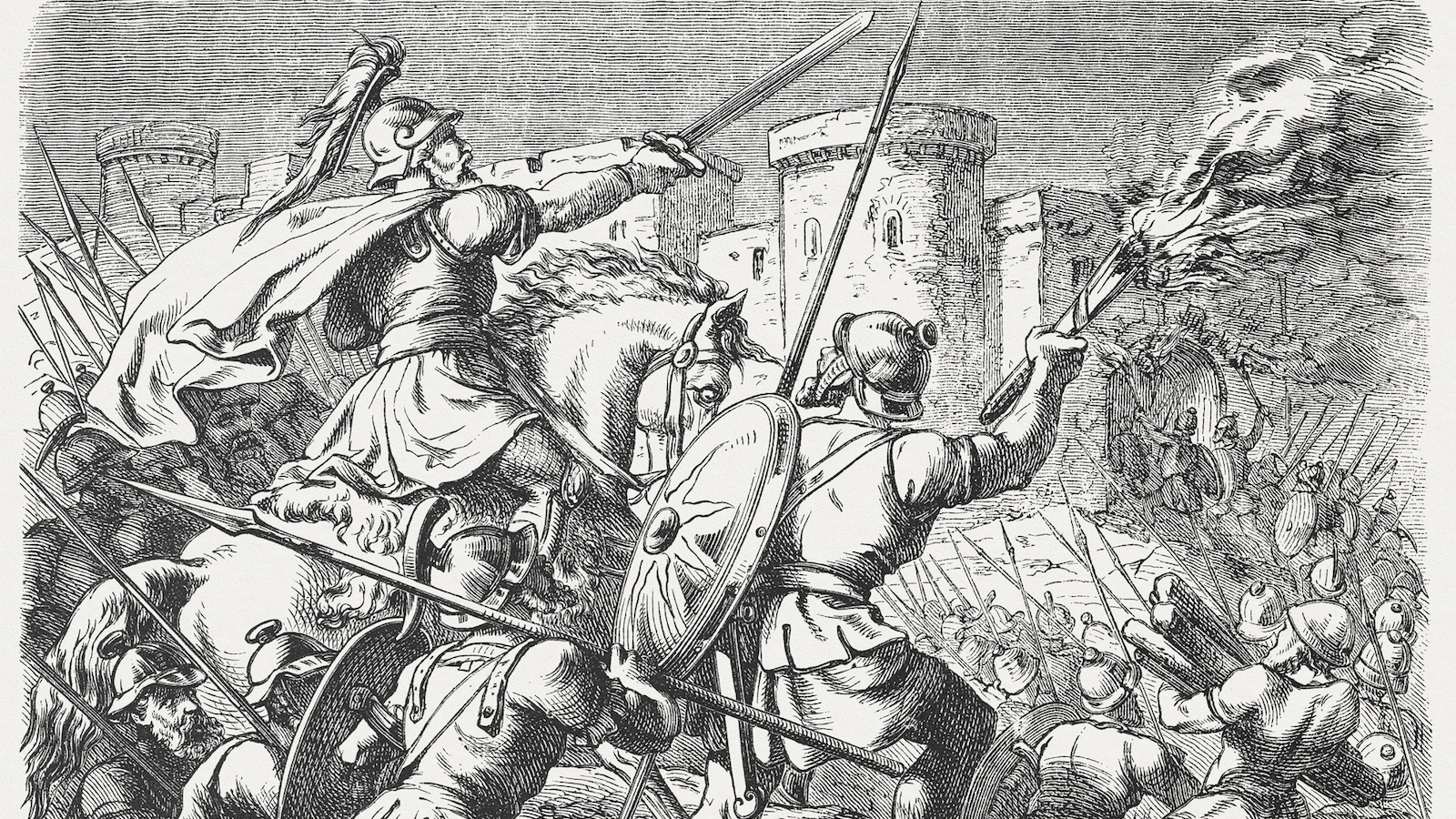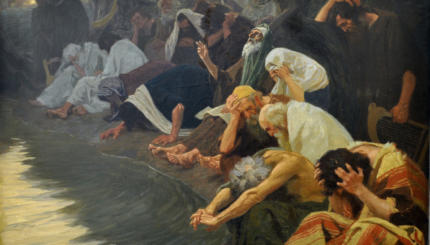The Book of Joshua is the first book in Nevi’im (Prophets), the second section of the Tanach (Hebrew Bible).
Read the Book of Joshua in Hebrew and English on Sefaria.
It is considered part of the Deuteronomic history that begins in Deuteronomy (in the ) and ends with the second Book of Kings (in Prophets). These books tell the story of the Israelites from the wandering in the desert to the establishment of a monarchy in the land of Israel.
The Six Books of Moses?
The Deuteronomic history is known for its emphasis on living in obedience to God and fulfilling the covenant. As God declares to Joshua in the opening chapter:

Help us keep Jewish knowledge accessible to millions of people around the world.
Your donation to My Jewish Learning fuels endless journeys of Jewish discovery. With your help, My Jewish Learning can continue to provide nonstop opportunities for learning, connection and growth.
“Every place that the sole of your foot will tread upon I have given to you, as I promised to Moses…Only be strong and very courageous, being careful to act in accordance with all the law that my servant Moses commanded you; do not turn from it to the right hand or to the left so that you may be successful wherever you go”
(Joshua 1:3-7)
By following God’s will the people will receive all the blessings of the land.
Joshua Bin Nun
The title character of the Book of Joshua is the son of Nun (Yehoshua Bin Nun), who figures heavily in the Torah as the protégé of Moses. Joshua appears early on as Moses’ sentry at the base of Mount Sinai during the Golden calf incident (Exodus 32). He also has an important role as one of the 12 spies sent into the land of Canaan, and one of only two who came back with positive reports about the land (Numbers 13).
Finally, after Moses strikes the rock and loses his right to enter the Land of Israel (Numbers 20), Joshua is designated the next leader of the Israelites. And it is under Joshua’s leadership that they enter the land of Canaan.
The overall story arc of the Book of Joshua involves the Israelites’ conquest and settlement of Canaan. The book as a whole can be broken down into three sections: The history of the conquest, the allocation of the land, and Joshua’s farewell speech.
Aside from its clean chronological order, the book also follows a geographical logic, from the east to west crossing into Canaan, to the circular conquest of the native tribes. First the Israelites conquer the nations in the center, then the south, and finally the northern and peripheral nations.
The Conquest
The Book of Joshua gives an extremely optimistic vision of the conquest of Canaan and tells several notable stories. The very first tale is the famous story of sending the spies into Jericho, where the prostitute, Rahab, protects them (Chapter 2). Once the spies escape the city safely, the Israelites are commanded to move in. Joshua leads the people across the Jordan River in a miraculous parting of the waters.
After the Israelites successfully cross into Canaan, they must reaffirm the covenant with God. The Israelites have been wandering in the desert for 40 years at the onset of the Book of Joshua, and before they can conquer the Holy Land, they have to prepare accordingly.
In Chapter 5:4, we find out that all of the men who came out of Egypt died during the journey in the wilderness, and all of the men who were born in the wilderness were not circumcised. So Joshua is instructed to institute a mass circumcision of all males before allowing them to continue. This act allows the Israelites to renew their covenant with God, and become worthy of the Promised Land.
From there they begin the systematic conquest of Canaan. By the end of Chapter 12, each native nation has fallen. The conquest is complete and allocation of land can begin.
Allocation of Land
From Chapters 13 to 22, the Book of Joshua provides a detailed account of how the land will be divided up among the tribes. Nearly all the tribes are settled between the Mediterranean Sea and the Jordan River, with a few glaring exceptions: Gad, Reuven and half of the tribe of Menashe, chose to settle on the eastern banks of the Jordan. This traces back to a story in Numbers where these tribes ask to settle the trans-Jordanian area. Moses agreed to this on the condition that these tribes would complete the conquest of the land before being allowed to return and settle it. Now with the capture of Canaan complete, the promise is fulfilled.
Joshua’s Life and Death
The book of Joshua contains many similarities to the story of Moses:
- Moses leads the Israelites out of Egypt. Joshua leads them into Canaan.
- Moses leads Israelites miraculously across Red Sea. Joshua leads them miraculously across the Jordan River.
- Moses sends out spies into Canaan. Joshua sends out two spies to Jericho.
- Moses allocates land on the east side of the Jordan. Joshua allocates land on the west side of the Jordan.
- And finally, Moses gives a prolonged address before dying, as does Joshua. This farewell address at the end of the book brings the parallelism between the two leaders full circle.
Joshua died when he was 110 years old. Only one other patriarchal figure lived exactly to 110: Joseph. And the Book of Joshua connects these two leaders in the final lines of the book. After Joshua has already passed away, we find this:
“The bones of Joseph, which the Israelites had brought up from Egypt, were buried at Shechem.”
(Joshua 24:32).
Joseph was responsible for bringing the Israelites down to Egypt. But Joshua has led the people back to the land of Canaan, officially ending the exile and opening a new chapter in Israelite history in which the people inherit their homeland.



